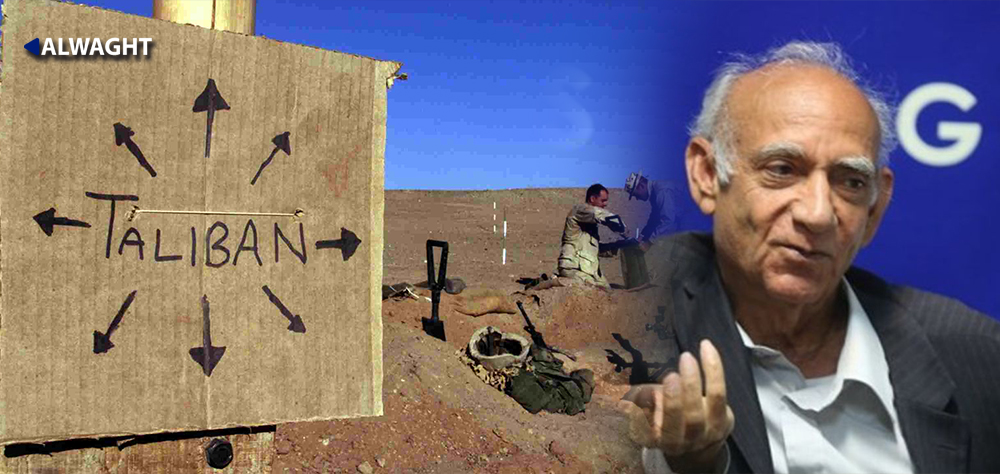Alwaght- The crisis in Afghanistan political scene these days has reached an alarming level and it seems that the bitter historical experience of collapse of the central government after withdrawal of the foreign forces is going to repeat itself. The central government is weakening increasingly and on the opposite side, the Taliban is making further advances. At present, the scenario of new civil war is closer to reality than ever.
The Taliban claim control of 85 percent of the country's territory and promise all neighboring countries security along the border. On the other hand, it seems that foreign actors are on the path to accepting the Taliban victory and negotiating with the group as Afghanistan's new rulers.
Alwaght, seeking answers to questions about various aspects of the current pervasive crisis, talked to Pir-Mohammed Mollazehi, an expert of Afghanistan affairs. Mr Mollazehi believes that the Taliban power gain would not be as easy as the media paint, but the certainty is that the US is the main loser of the Afghanistan developments since 2001.
Taliban plans for political transition period
Regarding the control of 85 percent of Afghanistan and also promise of constructive interaction with foreign countries, Mr Mollazehi said that the Taliban must be evaluated and analyzed from both ideological and political perspectives. From the ideological perspective, the group did not change much in its initial positions and continues to emphasize the establishment of the Islamic Emirate with all its requirements. In the meantime, it should be noted that the rights of different ethnic groups and minorities, women's rights, the achievements of liberal democratic politicians in the last 20 years, civil liberties, and freedom of hijab are not compatible with the ideological dimension of the Taliban.
"But we should know that they, to assume the power and steer clear of home and foreign threats, have changed their political views. After all, the Taliban have grown more experienced than before and plan to avoid vast restrictions on the civil freedoms. Or at least they at present pretend to have milder positions than before."
Washington the losing side of Afghanistan developments
Commenting on Biden remarks and stances related to the increasing Taliban power gain, Mr Mollazehi held that the Americans have failed to achieve their goals in Afghanistan. But Washington, unlike the Russians in the 1980s and the British in 19 century, has not accepted the military defeat. Learning from the Soviets and the British, the Americans made a political decision to negotiate with the Taliban before the same fate befell them and Afghanistan became another Vietnam, with the talks culminating in the Doha agreement. But it should be noted that the withdrawal of the US does not mean that they have not failed. Realistically speaking, Washington has failed in its goals. It intended to transform Afghanistan into the Japan of the region, but the reality is that it failed in its nation-state building initiative. The Americans once bragged about their intention to obliterate all of extremist and terrorist groups in Afghanistan, but now have negotiated and struck a deal with them.
Civil war possible
Asked about the political future of the country, the Afghanistan affairs expert answered he believed that the Taliban have so far not acted out of framework of the Doha agreement. Part of the Doha agreement is not revealed yet. In the secret part very likely the Taliban power gain is addressed. But how this power gain takes place– either through military force or elections– is a matter of debate.
"Either the Taliban enter a coalition government or a new government is formed after collapse of the current one is a matter of speculation. If it is by military force, the group can easily seize the capital Kabul. I believe that the current plan is that the Taliban focuses on taking control of border regions. Over the past few days, many border lines fell to the group."
In general, in such an atmosphere, it seems that there are no more than two solutions. One is a political solution that can be pursued in the form of intra-Afghan negotiations, which was reflected in the talks between the two sides in Tehran over the past two days. Another is the military solution through control of Kabul. But a military solution for the Taliban will not be without costs, and it is possible that a civil war will break out and the Taliban will not be able to make significant gains through the conflict. There is even a possibility that Afghanistan will be split into Khorasan and Pashtunistan, which is not a good scenario for the Taliban. The split bears serious risks to the regional and transregional states and odds are they will have to intervene.
"We can conclude that Doha agreement is being implemented for the short term and an interim government, headed by the Taliban, will be formed after collapse of the current government. Other possibility is that the Taliban acts towards seizure of power and politics and officially turns the country into scene of its unilateral power play."



























